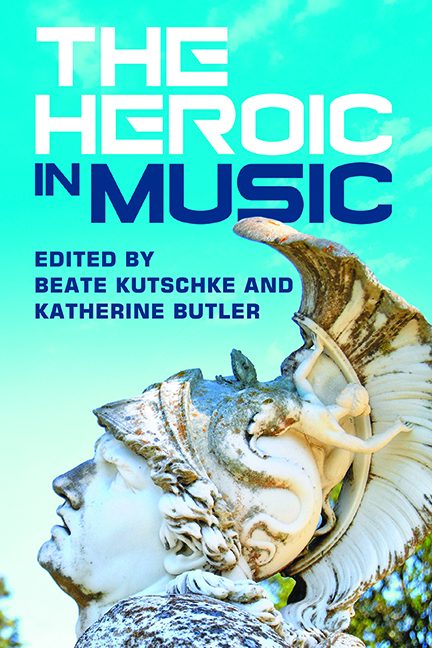Book contents
- Frontmatter
- Contents
- List of Illustrations
- Notes on Contributors
- Introduction
- Part I The Configuration of Heroic Music as a Tool for Shaping Moral and Political Identity
- Part II Music, its Ethics and Politics – Beyond ‘Beethoven Hero’
- Part III Heroic Music and its Moralities in Dictatorships and Post-Heroic Democracies
- Bibliography
- Index
7 - Music, Content, and Context: The Case of Nineteenth-Century Hungarian Music in the Light of the Romantic Heroic Vision
Published online by Cambridge University Press: 16 July 2022
- Frontmatter
- Contents
- List of Illustrations
- Notes on Contributors
- Introduction
- Part I The Configuration of Heroic Music as a Tool for Shaping Moral and Political Identity
- Part II Music, its Ethics and Politics – Beyond ‘Beethoven Hero’
- Part III Heroic Music and its Moralities in Dictatorships and Post-Heroic Democracies
- Bibliography
- Index
Summary
This study explores the relationship between music, its attributed meanings, and its multiple contexts in the case of nineteenth-century Hungarian music. One of the most interesting factors shaping musical meaning in this repertory is the prevalent nineteenth-century musical discourse in which Hungarian music was widely considered as prominently heroic. In this chapter, this discourse will serve as a starting point to investigate two main questions. Firstly, the study will carefully analyse the musical means that stimulated listeners and writers on music to attribute specific meaning to this repertory. Secondly, the chapter will present extra-musical factors – historical, music historical, cultural, and psychological – that shaped this meaning attributed to music. As we will see, these points – musical elements and extra-musical factors – cannot be investigated as completely separated from each other.
General Remarks Concerning the Western Heroic Vision Applied to Hungarian Music: Historical and Music Historical Background
In the nineteenth century, Hungarian music was often perceived abroad as particularly heroic. This opinion was mirrored several times in the French musical and general press. In 1840 the Parisian public first had the opportunity to hear this music interpreted by native musicians (i.e. Hungarian Gypsies). In his review for Le National, Joseph Mainzer (a German music critic and writer for several French newspapers) drew attention to the inherent heroism of the Hungarian melodies that had been played. He described different expressive characteristics linked to the music (impulses of joy, sadness, melancholy, and poetic power). Then he continued by underlining the heroic character in these Hungarian pieces, which he saw as mainly marked by warlike features: ‘Sometimes they are… heroic songs, a call to the heart, or accents which radiate national pride; sacred hymns which resounded on the battlefields’. More than thirty years later, one can detect in the written sources that the same opinion was firmly implanted in people's minds. In his article on different national or folk repertories published in 1874, Louis Lacombe interpreted Hungarian music partly as an embodiment of modes of behaviour that can be considered as related to heroic ideas (although without mentioning the word ‘heroism’) because they explicitly expressed the desire for freedom. Moreover, Lacombe also evoked warlike associations: ‘the warrior's ardour, the independence conquered by dint of life… all of this is expressed by Hungarian national songs.’
- Type
- Chapter
- Information
- The Heroic in Music , pp. 129 - 144Publisher: Boydell & BrewerPrint publication year: 2022



